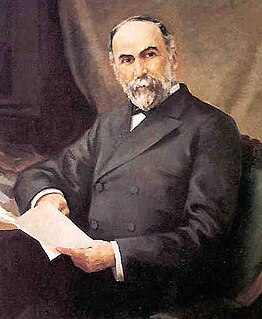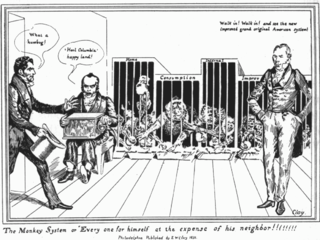This is a list of tariffs and trade legislation:
This is a list of tariffs and trade legislation:
The General Agreement on Tariffs and Trade (GATT) is a legal agreement between many countries, whose overall purpose was to promote international trade by reducing or eliminating trade barriers such as tariffs or quotas. According to its preamble, its purpose was the "substantial reduction of tariffs and other trade barriers and the elimination of preferences, on a reciprocal and mutually advantageous basis."

The Tariff Act of 1930, commonly known as the Smoot–Hawley Tariff or Hawley–Smoot Tariff, was a law that implemented protectionist trade policies in the United States. Sponsored by Senator Reed Smoot and Representative Willis C. Hawley, it was signed by President Herbert Hoover on June 17, 1930. The act raised US tariffs on over 20,000 imported goods.
A tariff is a tax imposed by a government of a country or of a supranational union on imports or exports of goods. Besides being a source of revenue for the government, import duties can also be a form of regulation of foreign trade and policy that taxes foreign products to encourage or safeguard domestic industry. Tariffs are among the most widely used instruments of protectionism, along with import and export quotas.
The Tariff of 1828 was a very high protective tariff that became law in the United States in May 1828. It was a bill designed to not pass Congress because it hurt both industry and farming, but surprisingly it passed. The bill was vehemently denounced in the South and escalated to a threat of civil war in the Nullification crisis of 1832–1833. The tariff was replaced in 1833 and the crisis ended. It was called "Tariff of Abominations" by its Southern detractors because of the effects it had on the Southern economy. It set a 38% tax on some imported goods and a 45% tax on certain imported raw materials.

The Tariff Act of 1890, commonly called the McKinley Tariff, was an act of the United States Congress, framed by then Representative William McKinley, that became law on October 1, 1890. The tariff raised the average duty on imports to almost fifty percent, an act designed to protect domestic industries from foreign competition; protectionism, a tactic supported by Republicans, was fiercely debated by politicians and condemned by Democrats.

Free trade is a trade policy that does not restrict imports or exports. It can also be understood as the free market idea applied to international trade. In government, free trade is predominantly advocated by political parties that hold economic liberal positions, while economic nationalist and left-wing political parties generally support protectionism, the opposite of free trade.

Protectionism, sometimes referred to as trade protectionism, is the economic policy of restricting imports from other countries through methods such as tariffs on imported goods, import quotas, and a variety of other government regulations. Proponents argue that protectionist policies shield the producers, businesses, and workers of the import-competing sector in the country from foreign competitors; however, they also reduce trade and adversely affect consumers in general, and harm the producers and workers in export sectors, both in the country implementing protectionist policies and in the countries protected against.

A trade agreement is a wide-ranging taxes, tariff and trade treaty that often includes investment guarantees. It exists when two or more countries agree on terms that help them trade with each other. The most common trade agreements are of the preferential and free trade types, which are concluded in order to reduce tariffs, quotas and other trade restrictions on items traded between the signatories.
The American School, also known as the National System, represents three different yet related constructs in politics, policy and philosophy. It was the American policy from the 1790s to the 1970s, waxing and waning in actual degrees and details of implementation. Historian Michael Lind describes it as a coherent applied economic philosophy with logical and conceptual relationships with other economic ideas.

A trade war is an economic conflict resulting from extreme protectionism in which states raise or create tariffs or other trade barriers against each other in response to trade barriers created by the other party. If tariffs are the exclusive mechanism, then such conflicts are known as customs wars, toll wars, or tariff wars; as a reprisal, the latter state may also increase the tariffs. Increased protection causes both nations' output compositions to move towards their autarky position. Minor trade disagreements are often called trade disputes when the war metaphor is hyperbolic.

Nelson Dingley Jr. was a journalist and politician from the U.S. state of Maine.

The United States International Trade Commission is an agency of the United States federal government that advises the legislative and executive branches on matters of trade. It is an independent, bipartisan entity that analyzes trade issues such as tariffs and competitiveness and publishes reports. As a quasi-judicial entity, the USITC investigates the impact of imports on U.S. industries, and directs actions against unfair trade practices, such as subsidies, dumping, intellectual property infringements, and copyright infringement.
The Tariff of 1857 was a major tax reduction in the United States that amended the Walker Tariff of 1846 by lowering rates to between 15% and 24%.

The Revenue Act of 1913, also known as the Underwood Tariff or the Underwood-Simmons Act, re-established a federal income tax in the United States and substantially lowered tariff rates. The act was sponsored by Representative Oscar Underwood, passed by the 63rd United States Congress, and signed into law by President Woodrow Wilson.
Tariffs have historically served a key role in the trade policy of the United States. Their purpose was to generate revenue for the federal government and to allow for import substitution industrialization by acting as a protective barrier around infant industries. They also aimed to reduce the trade deficit and the pressure of foreign competition. Tariffs were one of the pillars of the American System that allowed the rapid development and industrialization of the United States. The United States pursued a protectionist policy from the beginning of the 19th century until the middle of the 20th century. Between 1861 and 1933, they had one of the highest average tariff rates on manufactured imports in the world. However American agricultural and industrial were cheaper than rival products and the tariff had an impact primarily on wool products. After 1942 the U.S. promoted worldwide free trade.

The American System was an economic plan that played an important role in American policy during the first half of the 19th century. Rooted in the "American School" ideas of Alexander Hamilton, the plan "consisted of three mutually reinforcing parts: a tariff to protect and promote American industry; a national bank to foster commerce; and federal subsidies for roads, canals, and other 'internal improvements' to develop profitable markets for agriculture". Congressman Henry Clay was the plan's foremost proponent and the first to refer to it as the "American System."

Solar power represented a very small part of electricity production in the United Kingdom (UK) until the 2010s when it increased rapidly, thanks to feed-in tariff (FIT) subsidies and the falling cost of photovoltaic (PV) panels.

The Trump tariffs are a series of United States tariffs imposed during the presidency of Donald Trump as part of his "America First" economic policy to reduce the United States trade deficit by shifting American trade policy from multilateral free trade agreements to bilateral trade deals. In January 2018, Trump imposed tariffs on solar panels and washing machines of 30 to 50 percent. In March 2018, he imposed tariffs on steel (25%) and aluminum (10%) from most countries, which, according to Morgan Stanley, covered an estimated 4.1 percent of U.S. imports. In June 2018, this was extended to the European Union, Canada, and Mexico. The Trump administration separately set and escalated tariffs on goods imported from China, leading to a trade war.

The China–United States trade war is an ongoing economic conflict between the People's Republic of China and the United States. In January 2018, U.S. President Donald Trump began setting tariffs and other trade barriers on China with the goal of forcing it to make changes to what the U.S. says are "unfair trade practices" and intellectual property theft. The Trump administration stated that these practices may contribute to the U.S.–China trade deficit, and that the Chinese government requires transfer of American technology to China. In response to US trade measures, the Chinese government accused the Trump administration of engaging in nationalist protectionism and took retaliatory action. After the trade war escalated through 2019, in January 2020 the two sides reached a tense phase one agreement; it expired in December 2021 with China failing by a wide margin to purchase American goods and services as agreed. By the end of the Trump presidency, the trade war was widely characterized as a failure.

Trump administration farmer bailouts are a series of United States bailout programs introduced in 2016 during the presidency of Donald Trump as a consequence of his "America First" economic policy to help US farmers suffering due to the US-China trade war and trade disputes with European Union, Japan, Canada, Mexico, and others. China and respectively European reconcilable tariffs imposed on peanut butter, soybeans, orange juice, and other agriculture products had hit hard, especially swing states, such as Iowa, Ohio, and Wisconsin.